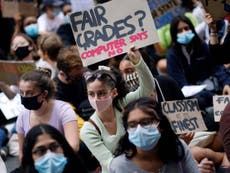When I voted Tory last year, I never imagined things would get this bad
It’s far better than a Corbyn administration would have been, but it would be wrong to pretend that the public shouldn’t feel angry and frustrated with the growing list of problems we’ve seen in recent months

When I voted for Boris Johnson’s Conservative Party in December 2019, I was full of hope for the year ahead. The party’s decisiveness and focus towards removing the Brexit uncertainties that were hampering business investment and the country’s economic growth had impressed me. And in all honesty, I was fed up with Jeremy Corbyn and the Labour Party’s radical socialist manifesto, which seemed to forget about people with middle incomes. So I jumped at the opportunity to vote for a party that would also reward those who worked hard to succeed, instead of punishing success with a myriad of taxes.
No government could have been prepared to deal with 2020, the year that brought Covid-19 to the shores of the United Kingdom, causing thousands of deaths and strain on global economies. While this year has been extraordinary, however, the government’s performance in recent months has been under more scrutiny than ever. Its overall handling of the pandemic has been questionable on many fronts, especially when compared with the performance of our European counterparts.
There have been a catalogue of errors: the time taken to lock the country down in March following the first cases and subsequent deaths from the coronavirus; the shortage of personal protective equipment ( PPE) for frontline workers; not to mention the rising death toll within care homes throughout April and May, which could have been avoided with swifter action. Then there were delays to passenger temperature checkpoints at airports with testing only beginning at Heathrow; major security flaws with the contact tracing app flagged in the same month; and now, an escalating A-Level and GCSE results crisis.
The government has scrambled at every turn. There are conceivable circumstances that permit the general public to feel angry and frustrated with the government – it would be wrong to deny this. I voted for Johnson’s leadership, but it has been lacking at key junctures throughout this pandemic.
This month’s ongoing exams crisis is yet another major blow for the government. I was initially in favour of the use of a computer algorithm to determine grades for A-Levels and GCSEs. At the time, I was worried that teacher assessments could be impacted by unconscious prejudices towards students, thus placing further disadvantages on black and ethnic minority pupils. I was wrong. The impact that the computer algorithm has had on pupils and parents has been just as damaging as it is outrageous. Ultimately, it’s important that pupils are judged on merit. Both of my children attend a fee-paying school, but the thought of private school pupils benefiting from computer modelling, which favours smaller classes or less popular subjects such as Latin, both of which are common in the private school sector, is deplorable.
It has created an extremely problematic situation, especially for pupils that have since lost out on a university place or work placements offered to pupils that were awarded the highest grades from the outset. The impact of this U-turn on universities has also left them struggling to accommodate more pupils and maintain social distancing, with other longer-term consequences to consider. With the oversupply of high-achieving pupils and projected oversupply to the labour market, the Ofqual computer modelling process has proven to be a costly mistake exacerbating an already uneven playing field.
In hindsight, the government should have postponed A-Levels and GCSEs until later in the year and pushed back university applications, as opposed to cancelling exams. Gavin Williamson was right to apologise for his handling of the A-level results, but he should have resigned when the U-turn was announced.
I don’t, however, think a cabinet shake-up is necessary at this stage in the pandemic. Such disruption would likely hinder the process of dealing with the ongoing challenges that Covid-19 presents. Despite some errors along the way, Rishi Sunak seems to appear the least scathed throughout the fiasco. The chancellor has done an adequate job managing the budget and introducing the furlough and various grant schemes. Johnson’s leadership has been tested with notable mistakes, and almost certainly more to come. There’s no dispute that any political party would have struggled to govern in a post-Covid society. But I genuinely believe that the government can learn from their initial errors to employ a more proactive strategy, as we have already seen with the faster regional lockdowns in Leicester, Yorkshire and Lancashire. Regardless, people need stronger leadership and certainty from the government in future.
Diana Young is the co-founder of PR and media intelligence tool Fashion and Beauty Insight and founder of digital marketing consultancy WeSocialis







Join our commenting forum
Join thought-provoking conversations, follow other Independent readers and see their replies